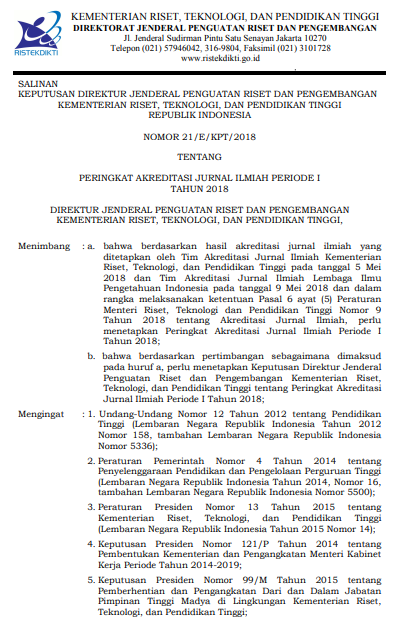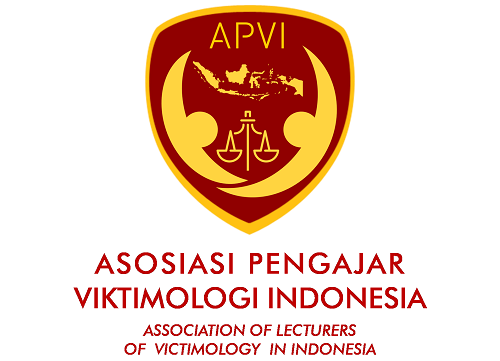The Impact of Indonesian Law No. 6/2014 on Women’s Political Participation in the Politics of Kelurahan: A Study on Kelurahan’s Community Empowerment Institution (LPMK) in Salatiga, Indonesia
Abstract
In Indonesia, decentralization and democratization have prompted the issue of women’s representation to be brought upon local and small-scale communities. One of the examples is the Indonesian Law No.6/2014 (the Village Act) in which the affirmative action for women’s participation is mandated in village’s representative body. Later, the same action is implemented in the urban counterpart to village’s rural that is Kelurahan, with the same Act –mutatis mutandis-. This article explores the implementation of Law No. 6/2014’s affirmative action to the kelurahan’s representative body, the Community Empowerment Institution or Lembaga Pemberdayaan Masyarakat Kelurahan (LPMK) in Salatiga. Acknowledging that there are fundamental differences between village and kelurahan, we found that such a maneuver has caused policy and practical inconsistencies where gender equality clause is omitted and the organization’s structure remains unreformed. Thus, it seems that the implementation of affirmative action for women participation in kelurahan’s politics has been withered before blooming.
Full Text:
PDFReferences
Abubakar, Mohammed and Zaid Bn Ahmad. 2014. “Women and Political Participation : Toward Attainment of 35 % Affirmative Action and Obstacles to the Women Participation in Nigerian Politics and Decision Making Process.” Journal of Research in Humanities and Social Science. 2(9):65–71.
Antlöv, Hans, Anna Wetterberg, and Leni Dharmawan. 2016. “Village Governance, Community Life, and the 2014 Village Law in Indonesia.” Bulletin of Indonesian Economic Studies. 52(2):161–83.
Banakar, Reza and Max Travers. 2005. “Introduction to Theory and Method in Socio-Legal Research.” in Reza Banakar and Max Travers (eds). Theory and Method in Socio-Legal Research. Oxford: Hart Publishing, 1-8
Barnes, Tiffany D., and Abby Córdova. 2016. "Making Space for Women: Explaining Citizen Support for Legislative Gender Quotas in Latin America." The Journal of Politics. 78(3), 670-686
Baviskar, B. S. (2002). “Including the Excluded, Empowering the Powerless”. Sociological Bulletin. 51(2). 168-174
Bayeh, Endalcachew. 2016. “The Role of Empowering Women and Achieving Gender Equality to the Sustainable Development of Ethiopia.” Pacific Science Review B: Humanities and Social Sciences. 2(1). 37–42.
Bebbington, A., Dharmawan, L., Fahmi, E., & Guggenheim, S. 2004. "Village Politics, Culture, and Community-Driven Development: Insights from Indonesia. Progress in Development Studies. 4(3), 187-205
Bjarnegård, Elin and Pär Zetterberg. 2014. “Why Are Representational Guarantees Adopted for Women and Minorities? Comparing Constituency Formation and Electoral Quota Design Within Countries.” Representation. 50(3). 307–320.
Boasiako KBA (2010) Public administration: Local government and decentralization in Ghana. Journal of African Studies and Development. 2 (7): 166-175.
Caplan, P. (1987). The Cultural Construction of Sexuality. Routledge. London
Celis, Karen. 2013. “Representativity in Times of Diversity: The Political Representation of Women.” Women’s Studies International Forum 41. 179–86.
Celis, Karen, Sarah Childs, Johanna Kantola, and Mona Lena Krook. 2008. “Rethinking Women's Substantive Representation.” Representation. 44(2). 99-110
Choi, N. 2018. "Women's Political Pathways in Southeast Asia". International Feminist Journal of Politics. 1-25. https://doi.org/10.1080/14616742.2018.1523683
Clayton, Amanda. 2015. "Women’s Political Engagement Under Quota-Mandated Female Representation: Evidence From a Randomized Policy Experiment." Comparative Political Studies. 48(3). 333-369
Cohen, Joshua. 1996. “Procedure and Substance in Deliberative Democracy.” in Shawn W. Rosenberg (ed). Deliberation, Participation, and Democracy. London: Palgrave-Macmillan, 219-236
Dahlerup, Drude. 2007. “Electoral Gender Quotas: Between Equality of Opportunity and Equality of Result.” Representation. 43(2). 73-92
Dahlerup, Drude and Lenita Freidenvall. 2005. “Quotas as a ‘fast Track’ to Equal Representation for Women.” International Feminist Journal of Politics. 7(1). 26-48
Dobinson, Ian, and Johns Francis. 2007. "Qualitative Legal Research." in Mike McConville and Wing Hong Chui (eds). Research Methods for Law. Edinburgh: Edinburgh University Press. 16-45
Fakih, M. (1999). Analisis Gender & Transformasi Sosial. Pustaka Pelajar. Yogyakarta
Harsanto, Bambang Tri, Slamet Rosyadi, Wahyuningrat Wahyuningrat, and Simin Simin. 2017. “Penguatan Kelembagaan Kelurahan Pasca Implementasi UU No. 23 Tahun 2014 Tentang Pemerintahan Daerah.” Masyarakat, Kebudayaan Dan Politik. 30(2). 188-196
Hendrik Mezak, Meray. 2006. “Jenis, Metode Dan Pendekatan Dalam Penelitian Hukum.” Law Review. 5(3). 85–97.
Hillyard, Paddy, Martin Partington, Sally Wheeler, and Michael Adler. 2007. “Law ’ s Empire : Socio-Legal Empirical Research in the Twenty-First Century.” Journal of Law and Society. 34(2). 266–279.
van Hoecke, Mark. 2015. “Methodology of Comparative Legal Research.” in Law and Method. 12.DOI: 10.5553/REM/.000010
Jameaba, Muyanja-Ssenyonga. 2013. How Has Decentralized Democracy Impacted on the Socioeconomic Well-Being of Workers and the General Public in Indonesia (June 23)? Available at SSRN: https://ssrn.com/abstract=2329099
Karpowitz, C. F. & Mansbridge, J. (2005). Disagreement and consensus: The need for dynamic updating in public deliberation. Journal of Public Deliberation, 1(1), 348-364
Krook, Mona Lena and Diana Z. O'Brien. 2010. “The Politics of Group Representation: Quotas for Women and Minorities Worldwide” Comparative Politics. 42(3). 253-272
Lues, Liezel. 2014. “Citizen Participation as a Contributor to Sustainable Democracy in South Africa.” International Review of Administrative Sciences. 80(4). 789-807
Maggio, J. 2007. "Can Subaltern be Heard?": Political Theory, Translation, Representation, and Gayatri Chakravorty Spivak". Alternatives: Global, Local, Political. 32(4), 419-443
Mansbridge, J. 2003. "Rethinking Representation". American Political Science Review. 97(4), 515-528
__________. 1999. "Should Blacks Represent Blacks and Women Represent Women? A Contingent 'Yes' ". The Journal of Politics. 61(3). https://doi.org/10.2307/2647821
McEwan, Cheryl. 2003. “‘Bringing Government to the People’: Women, Local Governance and Community Participation in South Africa.” Geoforum. 34(4). 469-481
Nkansah, Lydia A. and Victor Chimbwanda. 2016. “Interdisciplinary Approach to Legal Scholarship: A Blend from the Qualitative Paradigm.” Asian Journal of Legal Education 3(1). 55–71.
Norris, Pippa. 2001. “Breaking the Barriers: Positive Discrimination Policies for Women.” in Jytte Klausen and Charles S. Maier. Has Liberalism Failed Women? Asuring Equal Representation in Europe and the United States. London: Palgrave-Macmillan. 89–110.
Nugroho, R. (2008). Gender dan Strategi Pengarusutamaannya di Indonesia. Pustaka Pelajar. Yogyakarta
Oakley, A. (1972). Sex, Gender, and Society. Routledge. London
Olken, Benjamin A. 2010. “Direct Democracy and Local Public Goods: Evidence from a Field Experiment in Indonesia.” American Political Science Review 104(2). 243–67.
Pande, R. 2003. "Can Mandated Political Representation Increase Policy Influence for Disadvantaged Minorities? Theory and Evidence from India". American Economic Review. 93(4), 1132-1151
Purwanti, A. 2015. “2015 Quota Law ’ S for Women in Politics : Implementation in Indonesia.” South East Asia Journal of Contemporary Business, Economics and Law 6(4). 28–36.
Pitkin, H. F. 1969. "The Concept of Representation". Political Science Quarterly. 84(4), 678-680
Rai, S. M. et al. (2006). “South Asia: Gender Quotas and the Politics of Empowerment: A Comparative Study”. In Drude D. (ed.), Women, Quota and Politics. Routledge. London. 222-245
Salim, Agus, Wahidah R. Bulan, Bejo Untung, Indro Laksono, and Karen Brock. 2017. Indonesia ’ s Village Law : Enabler or Constraint for More Accountable Governance ? (Making All Voices Count Research Report). Brighton: IDS
Sanbonmatsu, K. 2003. "Gender-related Political Knowledge and the Descriptive Representation of Women". Political Behavior. 25(4), 367-388
Schwindt-Bayer, L. 2009. "Making Quotas Work: The Effect of Gender Quota Laws on the Election of Women". Legislative Studies Quarterly. 34(1), 5-28
Sen, Amartya Kumar. 1999. “Democracy as a Universal Value.” Journal of Democracy. 10(3). 3-17
Siregar, Wahidah Zein Br. 2005. “Parliamentary Representation of Women in Indonesia: The Struggle for a Quota.” Asian Journal of Women’s Studies 11(3). 36–72.
Springett, Delyse and Barry Foster. 2005. “Whom Is Sustainable Development For ? Deliberative Democracy and the Role of Unions.” Sustainable Development. 13 (5). 271–81.
UN Women. 2016. Women and Sustainable Development Goals. Nairobi: East and Southern Africe Regional Office
UNDP. 2015. Sustainable Development Goals (SDGs). New York:United Nations Development Programme.
_____. 2017. Change Makers Programming For Gender Equality And Helping Men And Women In Indonesia Shape A Fairer World. Jakarta:UNDP Indonesia
Urbinati, Nadia and Mark E. Warren. 2008. “The Concept of Representation in Contemporary Democratic Theory.” Annual Review of Political Science. 11. 387-41
Vel, Jacqueline, and Adriaan Bedner. 2015. “Decentralisation and Village Governance in Indonesia : The Return to the Nagari and the 2014 Village Law.” The Journal of Legal Pluralism and Unofficial Law. 47(3). 493–507.
Vel, Jacqueline, Yando Zakaria, and Adriaan Bedner. 2017. “Law-Making as a Strategy for Change : Indonesia ’ s New Village Law.” Asian Journal of Law and Society 4(2). 447-471
DOI: https://doi.org/10.20884/1.jdh.2019.19.2.2546
Refbacks
- There are currently no refbacks.
JURNAL DINAMIKA HUKUM Indexed by :
 | Jurnal Dinamika Hukum | |
| Faculty of Law, Universitas Jenderal Soedirman | Copyright of Jurnal Dinamika Hukum | |
| Yustisia IV Building, Law Journal Center | ISSN 2407-6562 (Online) ISSN 1410-0797 (Print) | |
| Purwokerto, Central Java, Indonesia, 53122 | JDH is licensed under a Creative Commons Attribution 4.0 International License | |






